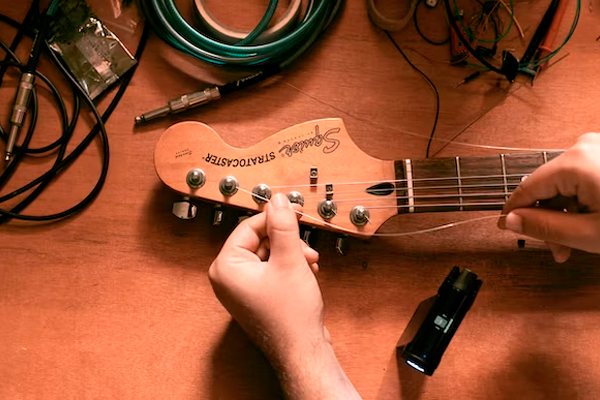
As a guitarist, one of the most frustrating things is when your guitar string breaks. It can happen at the most inconvenient times, right in the middle of a performance or even during practice. But just how often do guitar strings break? And is it common for guitar strings to break? In this article, we will explore the reasons why guitar strings break and how often you should change them. It might be expensive to change an electric guitar string, and nylon strings are cheaper, and steel strings on a classical guitar too, but it is better to not have to change them.
Table of Contents
Is It Common for Guitar Strings to Break?
It’s normal for guitar strings to break eventually. Electric guitar strings break from time to time. However, it’s not something that should happen frequently with your set of strings. If you find that your guitar strings keep breaking, even when they are new strings, there may be underlying issues that need to be addressed, some problems with a fret, for example. Strings tend to be sensitive to guitar curve, especially acoustic guitar strings when you play guitar.
Why You Keep Breaking Guitar Strings?
There are several reasons why guitar strings break. One of the main reasons is wear and tear. Over time, the strings lose their elasticity and become more brittle, which can cause them to break. Another reason is the quality of the strings. Cheap, low-quality strings are more prone to breaking than higher-quality strings.
Bending strings excessively or using a heavy guitar pick can also cause your strings to break prematurely. Everyone would agree that it is better to play without breaking strings, because guitar strings can break unexpectedly while you are playing the guitar, when players don’t have a chance to change their strings. Strings need careful treatment, no matter what the strings are made of.
How Common Is It for a Guitar String to Snap?

Image by Thomas Kelley from Unplash
It’s normal for guitar strings to eventually break due to wear and tear. However, if your strings are breaking more frequently than every few months, there may be an underlying issue that needs to be addressed. If you are asking yourself how often do electric guitar strings break, there might already be a problem, because usually guitarists change strings rarely and don’t give it as much thought. A new set of strings might be pretty expensive, especially if you are changing your old strings into new steel strings.
How often do guitar strings break?
The lifespan of steel guitar strings depends on various factors like the type of guitar, the quality of the strings, and how often they are played. On average, guitar strings can last anywhere from a few weeks to a few months, depending on how often you play your guitar. Often guitar strings break from wear. If you properly store your guitar, strings tend to last longer. The strings are generally not fragile.
If you purchase your guitar and strings are of low quality, this puts the strings to wear danger. Take your guitar to a specialist and change strings. Strings on electric guitars tend to be more expensive, they are heavier strings. Nylon strings tend to break more often, they might break every few months, if you are not careful.
How Often Should Strings Break?
Your guitar strings should not break frequently. If you find that your strings are breaking every few weeks or even days, there may be an underlying issue that needs to be addressed. The electric guitar strings tend to be sturdier, but they might also break. You need to change your strings more often, if you think they might snap. But you don’t want to change your strings too often, it’s counterproductive.
How Long it Takes for Guitar Strings to Break?
The length of time it takes for guitar strings to break depends on various factors like how often you play your guitar, the quality of the strings, and the type of guitar. On average, guitar strings often can last anywhere from a few weeks to a few months. Cleaning the strings will help them last longer, and the strings will continue to be playable.
Strings are still playable when they are old, but they sound worse, and a little trick like wiping your strings on a guitar might help. But of course, if they are going to break, just change them, no matter electric and acoustic. The guitar strings don’t sound well when they are on the verge of breaking. Strings won’t be as good-sounding in that state.
How Often You Should Change Guitar Strings?

Image by Victor Raimundo from Unplash
As a rule of thumb, you should change your guitar strings every few months, or sooner if you play your guitar frequently. However, if you notice that your strings are starting to sound dull or are losing their tone, it may be time to change them. Experienced musicians don’t break strings at all, because they change them in time.
If you’re not using your experience to understand when the strings without change might break, you should. Strings still play when they are close to breaking, but badly. And acoustic strings played daily break sooner. Strings that never break do not exist, but some rarely break and last around a year, though acoustic ones tend to break earlier.
Tips:
– Use coated strings to help them last longer.
– Wipe down your strings after each use to help prevent them from breaking.
– Avoid excessive bending of the strings.
– Use a lighter guitar pick to avoid putting too much stress on the strings.
– Clean your guitar regularly to prevent dirt and grime from building up on the strings.
Warnings:
– Never play your guitar with worn-out strings as it can cause damage to your guitar.
– Do not wait too long to change your strings as it can cause them to break prematurely.
– Do not use uncoated strings if you want your strings to last longer.
In conclusion, guitar strings are quite resilient and can last a long time if they are taken care of properly. If you want to keep your guitar strings from breaking, it’s essential to ensure that your guitar is in good condition and that you change your strings regularly. By following these tips and warnings, you can ensure that your guitar strings will last as long as possible and avoid any unnecessary frustration.






